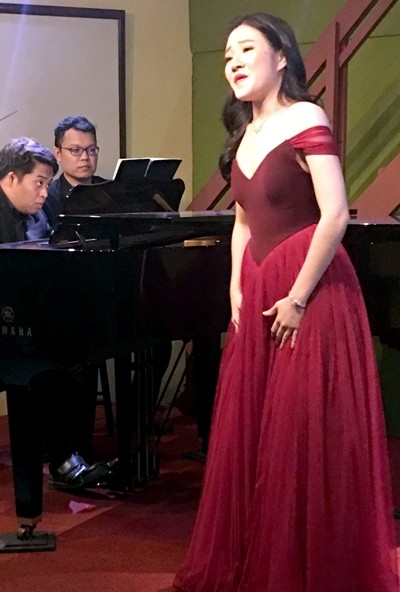
Ben’s Theater in Jomtien recently presented a sparkling concert featuring three sopranos, a baritone and two pianists. The sopranos were Pijarin Wiriyasakdakul, Duangamorn Fu and Pariyachart Sitthidamrongkarn, all from the College of Music at Mahidol University. They were joined by the Taiwanese baritone Rios Li and accompanied by the brilliant young Thai pianists Anant Changwaiwit and Siri Sranoi.
The concert opened with a splendid performance of the duet from Humperdinck’s opera Hansel and Gretel. Brüderchen, komm, tanz mit mir was sung by Pijarin and Duangamorn who oozed confidence and charmed the audience with their captivating performance. It was one of the highlights of the evening, as was Duangamorn’s singing of Rachmaninoff’s melancholy piece Oh never sing to me again. She really conveyed the emotion of the song and I was impressed by her fine intonation and sense of phrasing.
Later in the programme Duangamorn gave a confident performance of Klänge der Heimat from the Strauss operetta Die Fledermaus. She began music lessons at the age of four and in recent years has performed in many concerts and recitals. She was one of the semi-finalists in the Alcamo International Opera Competition in Sicily.
Pijarin gave a fine performance of Ständchen, composed by Richard Strauss in 1886. She sang with clear tone and excellent intonation. She began singing at the age of thirteen and last year was a soloist in Beethoven’s Ninth Symphony with the Thailand Philharmonic Orchestra. In February she will be soprano soloist with the same orchestra in Mahler’s Fourth Symphony. I was impressed with her singing of Spiel’ ich die Unschuld vom Lande also from Die Fledermaus in which she captivated the audience with her confident and well dramatized performance of the aria, which also demands a good deal of vocal dexterity.
Pariyachart’s first musical offering was Ombre légère from Meyerbeer’s 1859 opera Dinorah in which the eponymous Dinorah dances and sings to her own shadow in the moonlight. Her powerful voice is impressive and pianist Siri Sranoi accompanied with a fine sense of rhythm. Even so, her performance of the much-loved Mesièku na nebi hublokém from Dvorak’s opera Rusalka seemed much more successful. It was one of the highlights of the evening and demonstrated Pariyachart’s pure vocal tone, well-controlled vibrato, accurate intonation and fine sense of phrasing.
I was also rather taken with her singing of the delightful Les filles des Cadix, a song for solo voice written in 1874 by Leo Delibes. Her performance really caught the dramatic Spanish flavour of the song. Perhaps her previous experience came in useful because she’s played many roles in musical theatre. All three sopranos are students of Prof. Nancy Tsui-Ping-Wei at Mahidol University College of Music.
Rios Li graduated from Thung-Hai University in Taiwan, where he received his Bachelor’s and Master’s degrees. His singing of Der Vögelfänger bin ich ja from Mozart’s 1791 opera The Magic Flute was confident and revealed his surprisingly powerful baritone voice. He sang with good diction and spot-on intonation although the camp performance struck me as somewhat over-the-top. He became more restrained in his presentation of Rossini’s solo song La Danza, a kind of novelty Neapolitan song which Rios sung in true Italian style. It also showed how well he can project his voice. He also gave a confident reading of the colourful aria Largo al Factotum from Rossini’s opera The Barber of Seville. This aria requires remarkable diction to fit in all the words and the driving, rhythmic accompaniment from Anant Changwaiwit was compelling.
Another musical highlight was the duet from Mozart’s opera Don Giovanni, La ci darem la mano, splendidly sung by Rios and Duangamorn with a good sense of ensemble and a finely judged accompaniment from Anant. A few years ago, Anant won First Prize in the Mozart International Piano Competition Thailand and is currently studying for his Master of Music degree at Mahidol. The prize-winning pianist Siri Sranoi has already completed his Bachelor and Masters degrees at the College of Music, Mahidol University.
Planning a vocal programme needs a thorough knowledge of each song and an understanding of how to contrast keys, dynamics, textures and moods. There also has to be a sense of flow. I feel sure that an expert hand was at work because the programme was exceptionally well-planned. It featured several duets which proved particularly popular with the audience.
The Pa-Pa-Pa-Papageno duet from The Magic Flute was sung by Pariyachart and Rios with good diction, stage presence and presentation. In case you’re wondering, this duet is sung in the opera by the bird-catcher Papageno who speaks bird language in short chirping syllables. His lady-friend, confusingly called Papagena, can also speak bird language. When they meet excitedly in the forest, they begin with bird-like chirping (“pa-pa-pa”) of each other’s names.

The Mozart was in complete contrast to another duet, Sous le dôme épais from the opera Lakmé by Delibes. Pariyachart and Duangamorn sang with good intonation and lovely vocal tone and their voices blended perfectly. The poised and ethereal final chord of the song was magical.
Pijarin and Duangamorn excelled in the duet Prenderò quel brunettino from Mozart’s Così fan tutte. Their voices blended well and they sang with a confident sense of ensemble. It was a well-planned performance in which the singers worked brilliantly together.
The programme concluded with Lehar’s evergreen duet Lippen Schweigen competently sung by Pijarin and Rios, and the evening ended with the entire ensemble singing the popular drinking song, the Brindisi from Verdi’s opera La Traviata. Judging from the howls of approval, it was much appreciated by the audience, some of whom might have been doing a bit of drinking themselves.




